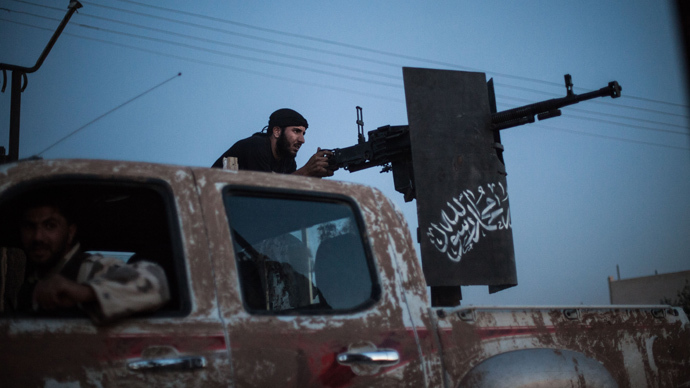Syrian conflict: Europe’s new role as a policeman

As the preparations for military intervention in Syria gain momentum, the key question is who will mastermind the hastily-formed anti-Assad coalition – an informal alliance of Western powers, Turkey and bloodthirsty Gulf monarchies.
Is it the United States of President Obama, the European Union of Baroness Ashton, Recep Erdogan’s bullying Turkey, or the royal families of Saudi Arabia and Qatar, cutting corners to dump Assad’s regime and meet their goals of regional dominance?
While obvious parallels are currently being made between the
Syrian crisis and the pre-war situation in Iraq 10 years ago,
some things look different today.
The first difference is America’s changed role. Despite growing
disappointment over the performance of the 2009 Nobel Peace Prize
winner, voiced by pacifists the world over, Barack Obama is no
George W. Bush. (At least, not yet.) The Mr. Bush who believed in
his supreme mission – the God-given right to decide on the fate
of nations – would have never hesitated to use force to wipe
Assad’s regime off of the face of the Earth, the way he did in
2003 with the regime of Iraqi strongman Saddam Hussein, a
personal enemy of the Bush family. He did it without a shadow of
self-doubt.
As for Obama, contrary to Bush’s unilateral logic and basic instincts, today he seems quite reluctant to take a final, complicated decision on Syria – even while he inches toward it. Over the last few days Obama has used intimidating rhetoric, pointing the finger at Damascus which, in his view, has “crossed a red line” by allegedly using chemical weapons. (This idea is denounced by Damascus and not seen as credible by Moscow and Beijing.) However, this looked more like a display of toughness, determined by Obama’s domestic political agenda – a forced move to please an army of his hard-line critics who accuse him of indecisiveness and inaction.

To see the difference, watch Obama’s latest interview to CNN, in which he speaks of multilateral cooperation as the key to military intervention in Syria. While Bush was proud of his war with Saddam – which he saw as a great crusade – his successor is making every effort not to be dragged into a war that would later probably be labeled “Obama’s Syrian morass.” So, it looks like Obama is not rushing to spearhead an anti-Assad alliance – even though he wishes the regime in Damascus would collapse.
The second difference from Iraq a decade ago – and probably, the
most striking one – is the rapidly changing role of Europe. In
2003, the leaders of the ‘Old World’ (except for British Prime
Minister Tony Blair) acted like good cops who had no stomach for
joining Bush’s so-called “Coalition of the Willing.” They warned
Bush clearly of the consequences of the war in Iraq.
At that time, Russian President Vladimir Putin, German Chancellor
Gerhard Schroeder and French President Jacques Chirac formed a
powerful trio that tried until the last moment to prevent the
invasion of Iraq (some analysts went as far as saying that the
disagreement with Bush served as a catalyst for forging a new
Russian-German-French alliance). The result of that disagreement
was an unprecedented chill in US relations with key EU allies. As
one American political pundit said to me at the time, “It will
take 10 years before Bush will shake hands with
Chirac.”
Well, 10 years have passed. In today’s Syrian crisis, we see quite a different Germany and France, and they are no longer playing the role of good cops. It is reported that Germany for the first time suggested it may support the use of force in Syria, with Chancellor Angela Merkel’s spokesman Steffen Seibert saying that the alleged “chemical attack must be punished.” As if echoing Berlin, French President Francois Hollande told Obama he would support a targeted military intervention in Syria. As Hollande’s Foreign Minister Laurent Fabius put it, “the only option that I can’t imagine would be doing nothing.”

So this time, the US and Europe have seemingly exchanged their traditional roles in dealing with “dictators” and “rogue states,” who in the Western view should be never tolerated. Europe is showing guts in not lagging behind the US. This time it is trying instead to lead the anti-Assad alliance (along with Turkey), while Obama would be quite happy to reduce the US role in a Syrian war to some limited action. It looks like Obama would be comfortable with the role of a mentor or coach, watching the final showdown with Assad from his distant bench, but not sweating it out in the field or spilling the blood of his servicemen.
What has made the key European players, who once voiced their strong reservations over the war in Iraq, to line up to join anti-Assad coalition this time? While every nation has its own foreign and security policy agenda, one of the reasons could be the political identity crisis in the European Union. Europe is desperately struggling to get out from under the US’s shadow and show that it can act on its own. No more an American poodle, but an independent strong player, who at some point could overtake the US – the former distant giant of the trans-Atlantic alliance.
Probably, this is still wishful thinking on the part of the
Europeans. Yet President Assad and millions of Syrians could
still serve as guinea pigs for that exercising of European
military might. And the cost of Europe’s ongoing European
identity crisis would be heavy indeed.
The statements, views and opinions expressed in this column are solely those of the author and do not necessarily represent those of RT.
The statements, views and opinions expressed in this column are solely those of the author and do not necessarily represent those of RT.













